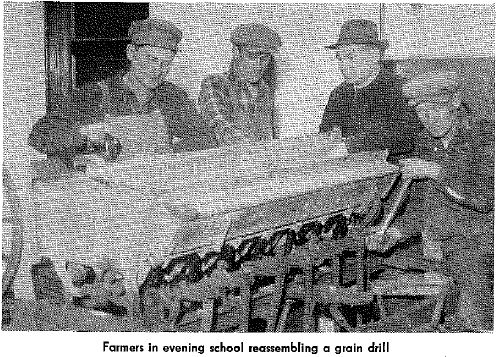By Cody McClain ’19
senior, agriscience education
“Go change the tire on my truck!” – Mr. Keck told his class. I heard Mr. Keck tell his class to perform this task when I was completing my early field experience (EFE) for agriscience education at Marysville High School. In Keck’s class, students explore their psychomotor skills and learn to work with their hands.
Mr. Bill Keck is an agriculture teacher and FFA advisor at Marysville High School. Along with being an agriculture teacher for 33 years, Keck is a farmer in the local Marysville community.
I met Mr. Keck for the first time during my EFE. Mr. Keck primarily teaches agricultural mechanics which include engines, woodworking, welding, electricity, hydraulics and much more. His passion for teaching agricultural mechanics inspired me pursue a minor in agricultural systems management, where I can focus on courses that will prepare me to teach this content. I thoroughly enjoyed interviewing Mr. Keck and hearing about his career teaching agriculture. As I prepare for student teaching this spring, I am looking forward to reflecting and utilizing the knowledge and skills that I learned during my EFE.
“Here is your pilot, he is studying to be a teacher, a job more important than being a pilot.”
Pathway to Marysville FFA
Mr. Keck’s passion for agricultural started with growing up on a small hobby farm and raising a few market steers for his supervised agricultural experience (SAE) project for FFA. He had always aimed to be a pilot; however, he was not sure if that was going to be a career, so along with aviation, he studied agricultural mechanization and agricultural education at The Ohio State University. He concentrated on his journey in teaching after he had a pilot, who was teaching Keck to fly, tell Keck that teaching is more important than being a pilot.
Student teaching was the hardest job but very rewarding, said Keck. Dr. Gliem and Dr. Hedges, faculty in the Department of Agricultural Education, were valuable mentors for Keck throughout his student teaching and graduate school experience. After starting his teaching career at Licking County JVS for two years, he then moved to Marysville where he has been for 31 years. He primarily teaches agricultural mechanics, and the content priorities for these courses have changed much in the past 33 years, Keck said. However, his ag mechanic laboratory (a.k.a. “the shop”) has changed with tools and equipment in the past 33 years. When Keck started teaching, he only had buzz box stick welders in his shop, but now he has wire feed welders and a virtual reality arc welder to train his students the fundamentals of welding.
“Teach students to be productive citizens of society. Agricultural education and FFA are great vehicle to do that.”
Impactful Teacher and FFA advisor
Keck has been a positive force in the world and impacts the lives of every student who walks into his classroom. He pushes students to be the absolute best that they can be at whatever they want to do. Whether a student wants to be veterinarian or electrician, he guides students to choose career pathways that suit their passion and skills. As an Ag Teacher and FFA advisor, Keck’s ultimate goal is to teach students to be productive citizens of society. He has enriched many lives through hands-on learning. He loves his job and plans to continue to pursue his passion of teaching agriculture and advising FFA members.
“Teaching is an important job.”
Importance of Agricultural Education
The bottom line is, teachers need to teach students how to work with their hands. From changing tires to cutting steel, students learn to work with their hands in Keck’s classroom and shop. Students need to learn psychomotor skills that prepare them to be productive citizens of society when they graduate high school. For Keck himself, learning psychomotor skills has been a lifelong learning experience. These are skills that are difficult to gain but extremely important. Agricultural education is the ideal place for students to learn these skills. As this industry moves forward, he believes we need teachers who teach with their hands, so their students learn those psychomotor skills. Keck played a role in preparing these teachers when he taught the laboratory management and pedagogy course at Ohio State from 2008 to 2012.
“Teachers raise kids, which has made it an important job in society,” said Keck. Ag education is the vehicle to change lives, and as a whole, society needs to continue to advocate and share the importance of agricultural education. From starting out wanting to be a pilot to teaching agriculture for 33 years, Keck has pursued an important and impactful career. He is looking forward to year 34. Keck is a remarkable agriculture educator, and we are grateful to have many like teachers like Keck in our schools across Ohio.








